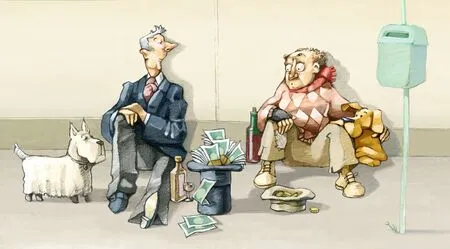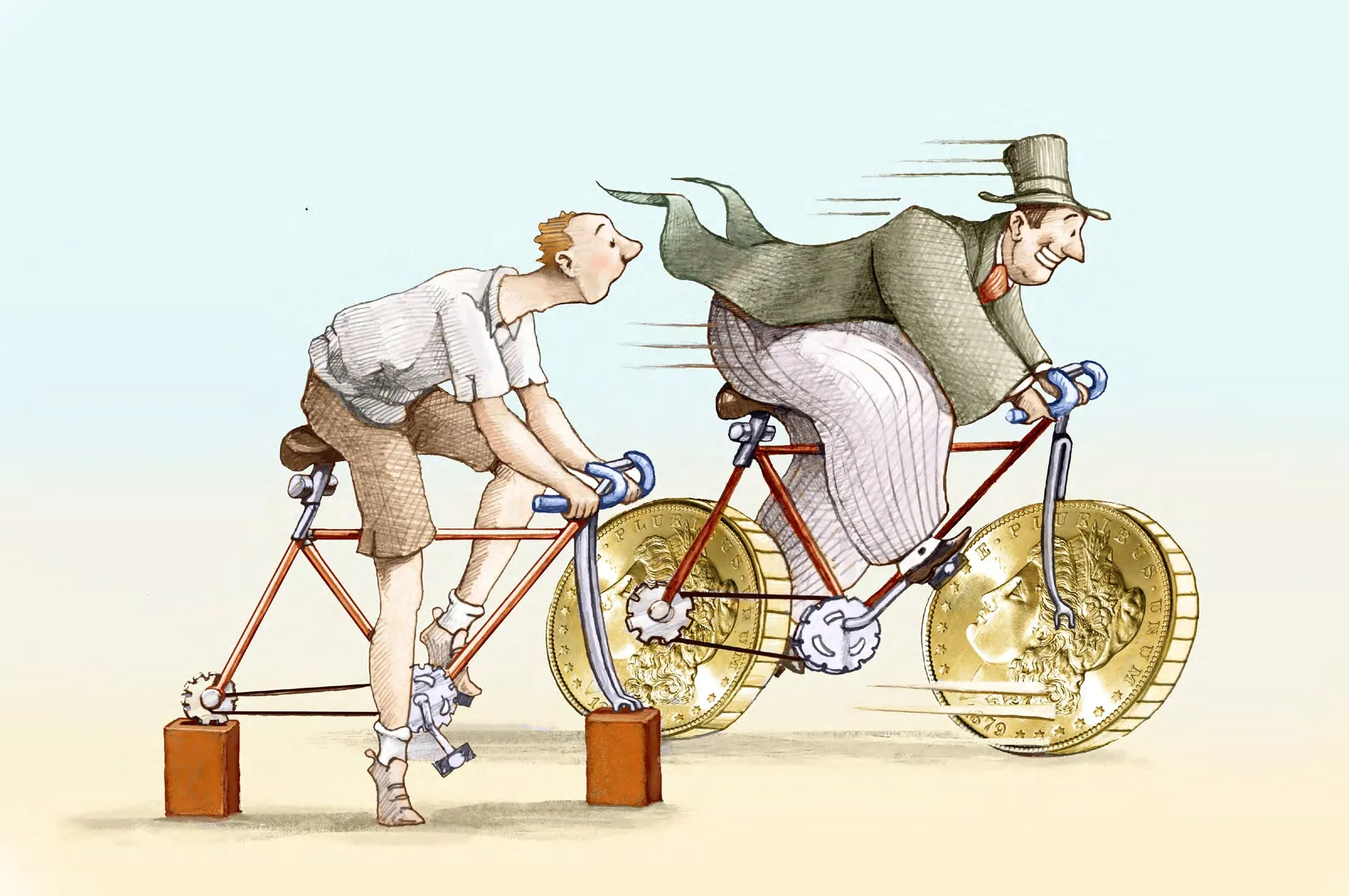Breaking Free from a Poverty-driven Mindset
By Wu Man Lan Jiang
I have a friend who has an unusual surname with an unusual pronunciation, Gang. For Chinese people, it is hard to remember.
Buying Ostrich and Selling Chicken
Old Gang used to be miserably poor. He was fined because he violated the then one-child policy and gave birth to three sons.
To help his sons marry good wives, Mr. Gang was wholeheartedly devoted to making money. Yet people in the countryside didn’t have many ways to make money, so Gang didn’t even know where to start on his road to riches. One year, the local government called for chicken raising which was a profitable industry, so Mr. Gang got himself a bunch of chicks and set up a chicken farm. But it’s not easy to look after chickens. Despite the huge effort he put into his chicken business, tragedy still struck.
Now that there were too many chickens in the market, the price fell sharply. In the past, large chicken farmers could support the whole family by selling 2,000 chickens a year, but Gang couldn’t even retrieve his cost by selling 5,000 chickens when he was in the business. What’s worse, while the price of live chickens fell, the price of fodder and land kept growing. Many farmers had no choice but to close their farms.
Mr. Gang believed that the price of chicken was falling not because of a bad market, but because of the poor quality of the chickens. He turned to raising high-end chickens.
After that, the old man left town and nobody knew his whereabouts.
Four months passed before he came back, during which more than half of his chickens had died.
When Mr. Gang came back four months later, he brought back an odd-looking chicken, which was taller than he was, with two big feet and a pair of huge curious eyes. It scared the locals, who asked, “Old Gang, what is it?”
To which Mr. Gang replied solemnly: “This is my new goods, the latest chicken breed. I named it Little Four. It will help my three sons get wives.”
“What?” The locals were befuddled, “Who are you trying to fool, Old Gang? We have seen these on TV. It’s obviously an ostrich.”
After Mr. Gang brought Little Four home, his business instantly started booming. For a long time, his family became a local tourist attraction, with people from near and far coming to see this rare animal. Among those ostrich-seers, there were children from local officials and business families, with whom Mr. Gang made friends. Through their connections, Gang successfully got himself into many government and enterprises associations, where he tried to sell his chickens. Having seen his face and heard his name, local slaughterhouses thought he was the only chicken farmer in the area and only purchased chickens from him.
After he sold all his chickens, Mr. Gang brought in live chickens from farmers who couldn’t sell, and sold them to the slaughterhouses as well. With this hand-changing play, he got all his money back and earned some.
Gradually fewer and fewer people came to see his ostrich. So every once in a while, he deliberately put out Little Four and let it run wild along the national road, which created hot news and attracted people from afar to see the ostrich.
In short, the old man is an unusual person, who deserves our attention and consideration.
The Cost of Low Quality
The story of Mr. Gang tells us what poverty is.
Poverty is not formidable. Getting trapped in poverty is formidable. Poverty means being used to a low-quality life and unable to break free.
Old Gang tried to be a chicken farmer, yet found himself surrounded by big chicken farmers who were more competitive. In order to stand out of the crowd, he put an ostrich among his chickens, which attracted people’s attention. Reputation gave Mr. Gang more opportunities and he got to make money in more than one industry.
We normal people have to tend to ourselves, our children, our careers, and our lives. This process is just like Mr. Gang’s chicken farming business: the lower the quality, the higher the costs, and the fiercer the market competition.
On the contrary, if you aim to go high, to cultivate virtues, get a decent job, find a good spouse, and raise good children, you are more likely to step out of the low-end market with fierce competition, break free from hardship, and win a new life.
Mr. Gang likes to drink wine and keeps some drinking buddies. People in the countryside don’t have much money on hand, and can only afford poor quality spirits. On one occasion, one of his drinking buddies had fake spirits and lost his sight forever. As a witness, Mr. Gang was shaken up deeply. He realized that low-quality lifestyles cause huge costs to one’s life. People think that inferior products can save money, yet on the contrary, they come with huge cost—sometimes one’s life.
A high-quality lifestyle is more cost-effective, with higher value.
Mr. Gang vowed to develop good habits, and thanks to Little Four the ostrich, now he only drinks good quality wine. He has a small cup before going to bed every day, which is enjoyable and healthy. While sleeping in bed and looked back on his life when he indulged in shoddy alcohol, he felt as if that was someone else’s life.
Thinking Outside the Box
In fact, all those who fall into poverty have some bad habits. They usually don’t want to change themselves, which means they need to pay huge costs to maintain these bad habits. The so-called “poverty-driven concept” also means being used to low-quality life, while “rich thinking” is just the pursuit of high-quality goals.

Thinking determines one’s way out. In a low-quality lifestyle, people have no protection, and they tend to stay in the status quo; they also tend to find spouses on the same level. As a result, their next generation is bound to be inf luenced by their impoverished thinking. A vicious cycle is formed here, which is difficult for them to get rid of.
On the contrary, the pursuit of high quality goals will help one develop good habits, for which you don’t have to pay. It’s bad habit that requires big costs. With high goals and a broad vision, one also tends to find good partners and raise hard-working children. It’s a positive cycle people can build in their lives, which will soon put a low quality lifestyle far behind.
High quality does not mean you will have money right away, but continuous innovative thinking and high-level pursuits will get you out of the entangling meaningless competition at the bottom. Those who are trapped in their own lives will instinctively hope others stay in their kind of life too. The Engel Coefficient shows that the poorer one is, the higher is the proportion of expenditure for fundamental needs; the richer one is, the smaller is the proportion, and the more likely people are going to pursue goals of higher level.
Thinking is an interesting thing. It takes just one spark of enlightenment to lift people out of dullness and meet wisdom, while one good choice can open up the road from poverty to prosperity. Everyone is limited by his or her own habitual ways of thinking. When one steps over the limit, and goes one step further into a place one has never trodden, the whole world can suddenly open up.
(From Say No to a Low Quality Life, China Friendship Publishing Company. Translation: Lu Qiongyao)

摆脱贫困思维
文/雾满拦江
我有个朋友,有个奇怪的姓,姓冮。这个姓念刚音,姓怪字怪,不好记。
买鸵鸟卖鸡
老冮以前是个穷人,穷到凄惨。他穷是因为超生,生了三个儿子。
为了给儿子说媳妇,老冮一门心思琢磨发财。乡下人门路窄,老冮想发财也不知从何发起。有一年,当地政府号召养鸡致富,老冮就搞来一堆小鸡崽,办起养鸡场。鸡这东西很不好养,老冮花费一番心思,把自己搞成养鸡专家,然后悲剧发生了。
鸡满为患,市场价格下滑厉害。以前的养鸡大户,一年只要卖2000只鸡,就足够解决一家老小的衣食温饱。现在老冮卖到5000只连本都回不来。生鸡价格下跌不说,饲料和地皮还涨价。许多养殖户一筹莫展,纷纷关场。
老冮认为,鸡价下跌,不是市场行情不好,而是鸡的质量不高。他转向养高档鸡。
说完,老冮就不知去去向,一走就是四个月,家里的鸡死了大半。
四个月后,老冮回来,身后跟着一只比他个头还高大的怪鸡,两只大脚板,一双好奇天真的巨眼。这东西把当地人差点没吓死,就问他:老冮,这是啥东西?
老冮严肃地回答:这是我进的货,最新的生鸡品种,我给它起名叫小四,让它回来替我那三个儿子娶媳妇的。
什么呀……当地人满脸懵懂:你欺负谁没看过电视咋地?你这明明是只鸵鸟。
自从老冮把小四儿带回家,他的生意瞬间爆棚。好长一段时间,他家成为当地的旅游胜地,三乡五里的人成群结队来看稀奇。老冮又在来看鸵鸟的孩子中,找出当地政商家庭的孩子,通过他们拉上关系,时不时地出席个政企联谊会什么的,捎带卖掉家里的鸡雏。而下游屠宰商受此事影响,以为老冮是当地唯一的养鸡户,只从他手中进货。
他把鸡全卖掉,又收购别人家卖不掉的活鸡,卖给下游,就这一倒手,本钱又全都回来了。

再此后,来看鸵鸟的人越来越少。老冮每隔一段时间,就故意把小四放出去,让小四沿国道撒欢狂奔一段时间,制造新闻热点。把远方的人也吸引来看鸵鸟。
总之,老冮是个很奇怪的人,有研究价值。
低品质代价
老冮的故事告诉我们什么叫贫困。
贫困不可怕,可怕的是被贫困住。贫困,意味着对低品质生活过度沉迷,无由挣脱。
老冮是养鸡的,但当邻近全都是养鸡大户时,老冮寻求破局,结果鸡群里钻出来一只鸵鸟,让老冮鸵立鸡群,尽显其高大上。这时候他的选择空间宽广,尽可以好整以暇,哪个行业赚钱,就在哪个行业多捞两瓢。
我们也都在养自己,养家人,养事业,养人生。这个过程,一如老冮之养鸡,其特点就是品质越低,成本越高,市场竞争越是惨烈。
相反,如果你有心往高处走,饲养自己高贵的品质、高尚的事业、高价值的配偶及孩子,就会步出竞争态势惨烈的低端市场,破局而出,赢得人生。
老冮喜欢喝点小酒,还有几个酒友。乡下人没钱,只能喝低劣的散白酒。有一次,有个酒友喝了有毒的假酒,导致双目失明。老冮目睹此事,心里极受震动。他清晰地感觉到,低品质的生活习惯,是需要巨大的人生成本来维持的。不要以为便宜的低劣产品能为你省钱,恰恰相反,你为低劣习惯支付的成本,重一点是自己的生命,轻一点是自己的人生。
唯有高品质的生活习惯,才是最省钱的,成本最低的。
老冮发誓要享受高品质习惯,托小四的福,现在他每天只喝品质好的酒,每天睡前一小杯,享受又养生。卧睡于床上,再回首当年沉迷于低劣酒精中的自己,恍如隔世。
走出惯性思维
事实上,举凡陷入贫困的人,都有一些坏毛病、坏习惯,他们自己不想改变,这意味着,他们需要支付巨大的人生成本维护这些坏毛病。我们通常所说的穷人思维,也是对低品质生活的迷恋,而所谓的富人思维,不过是对高品质目标的追求。
思维决定出路。低品质的人生,生活没有保障,甘于生活现状,如果再寻找与自己品质相当的配偶,势必以同样的观念影响下一代,形成一个恶性循环,难以摆脱。
相反,高品质的追求会形成高品质的习惯,而好习惯多数是不需要付费的,坏习惯才要支付大成本。再加上目标高远,眼界开阔,寻找伴侣时更注重内在品质,在对孩子的教育上,也是鼓励孩子自己努力奋斗,让孩子成为一个高品质的追求者,这个过程是非常省心的,很快就会和低品质的生活拉开距离。
高品质不意味着马上就会有钱,但持续的思维破局与高远追求,会让你摆脱开人类观念金字塔下的纠缠性竞争。那些困死自己的人,也会本能地希望以低品质观念困住别人。恩格尔系数说明,越是贫困,用以维持温饱的开支比重就越高;越是富裕,用于维持温饱的开支比重就越小,就越是有余力追求更高层次的快感。
思维这东西很奇怪。从愚钝到智慧,不过是个开悟而已。从贫困到富裕,不过是个选择而已。每个人都被自己的惯性思维困住,只要你打开它,向那不曾涉猎的地方前行一步,你的整个世界,就会豁然开朗。

